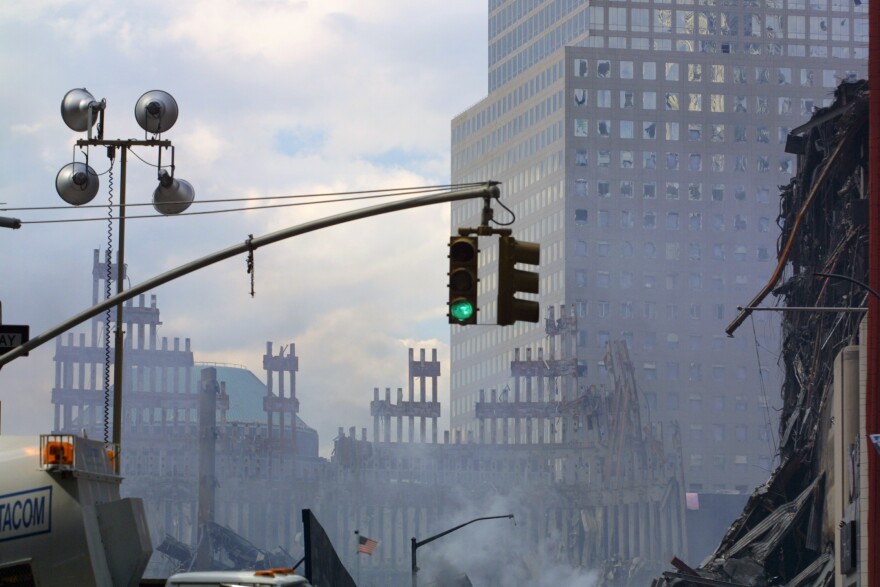Pamela McCall is KUER's Morning Edition host. But 20 years ago, she was working in New York City for CBS News Radio. She covered the 9/11 terrorist attacks live in lower Manhattan for that news outlet. She joined Caroline Ballard to talk about her memories of that day.
A warning that this interview contains descriptions that may be disturbing to some listeners.
This interview has been edited for length and clarity.
Caroline Ballard: Where were you when the first plane hit the North Tower that morning?
Pamela McCall: I was in my apartment on the Upper West Side. It was a day off. I was heading to the beach with a friend who worked for Reuters. And the phone rang at the last minute and it was CBS News saying a plane had hit the World Trade Center. Could I go cover it? At that point, I did not know it was a passenger plane. I just grabbed my gear, got in a taxi and was on the West Side Highway, essentially the only civilian vehicle, just ambulances and emergency vehicles, a sea of them heading to southern Manhattan.
CB: What did you see when you got there?
PM: The buildings were on fire, people were leaving, clutching their mouths, as we do when we're frightened. There was a lot of horror, a lot of disbelief. At that time, it was a fire that was caused by planes crashing into the World Trade Center. Of course, it got much worse from there.
CB: What was it like as you were there and watching the towers collapse?
PM: It was surreal. At first, it wasn't obvious that an entire tower had come down. There was so much debris in the air that you could see that the top of it was missing. But obviously it became evident fairly quickly that this whole building, the first tower, had imploded. And a little while later, the second tower, very shocking.
CB: We have some tape from your reporting right after that collapse. Let's take a listen.
I'm standing here watching ambulances go by. They are covered in about three inches of soot and ashes. It resembles the scene of a volcanic eruption with firemen and the emergency personnel now donning face masks so that they can breathe through this. I'm looking down at the site of what used to be the World Trade Center towers. They're both gone.
PM: It was very tough to watch and to record, but it was also something that the world needed to know at that point. The smell was horrific, the scene of absolute shock and the screams — it was very frightening. But you go into a mode as a reporter — or anybody who's been in a car accident — where shock takes over and you do what's necessary. But it was disbelief upon disbelief.
CB: What has stayed with you the most in the years since the attacks?
PM: I've been thinking about firefighters a lot. There was one firefighter that was leaving the scene. It was a fire chief and his helmet was covered in ash and tears were streaming down his face. And that image is with me. There's that, and I mentioned the smell. Whenever I'm near a construction site, there's the potential for that trigger because of the smell of the pulverized buildings. I also remember the sirens. The sirens just were endless and endless. And a great deal of grief and disbelief. The grief still stays with me. I covered two anniversaries after that day, and a lot of people lost loved ones. That grief is etched.
CB: As 9/11 becomes a moment in history many younger people have no firsthand memory of, what would you want them to know about what it was like to be there?
PM: The flip side of such a horrible attack was the good that I saw in people. I rode in with firefighters the next day. They were chomping on huge cigars and fighting back tears, and the West Side Highway was lined with well-wishers and signs saying "you are heroes." People could not do enough for one another. And I think that that is just the flip side of how horrific it was, is that the best in people came out. I hold that dear to my heart and try to bring that memory to the forefront whenever it gets really sad — and it gets sad.



